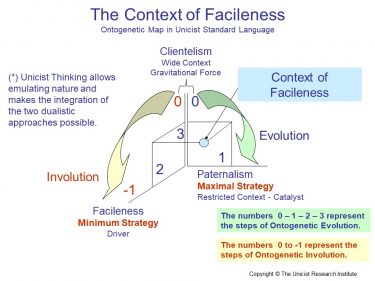Facileness, Clientelism and Paternalism
Facileness expands too fast in too many places in the world. Facileness becomes an addiction when it is integrated with clientelism and paternalism.
When it becomes an addiction, it forces the environment to adopt an over-adaptive behavior which establishes a context where facileness, protected by a set of fallacious myths, appears as a functional “way of life”.
About Facileness
Facileness implies making what one believes, wants or can do prevail over what is needed to be done. Facileness degrades, marginalizes and kills social, institutional and personal evolution.
About Clientelism
Clientelism is the exchange of goods and services for support. Clientelism reverts the slope of the asymmetry of the relation between authorities and members of a group or culture.
The one who receives the goods or services behaves as the client and the authority behaves as a provider. This corrupts the relationships and establishes a structural context for facileness.
About Paternalism
Paternalism is an action that limits a person’s or group’s freedom or autonomy.
Paternalism is the consequence of two actions. On the one hand there is someone who wants to control an environment and on the other hand there are people, who are driven by facileness, that want to avoid assuming the responsibility for their actions.
Paternalism protects the people who adopt facileness as a way of life and uses clientelism to ensure the sustainability of its power.
The absence of paternalistic leaders is the solution for facileness driven environments. It begins by generating chaos but ends in an upgrade if the preexisting paternalistic leaders have established a structural approach.
If this is not the case, the new situation degrades the environment and a new paternalistic leader becomes installed.
Peter Belohlavek
NOTE: The Unicist Research Institute has been, since 1976, the pioneer in complexity science research where the Unicist Evolutionary Approach was developed.
